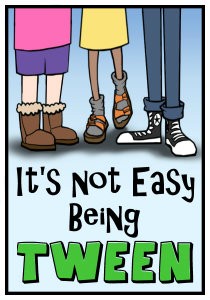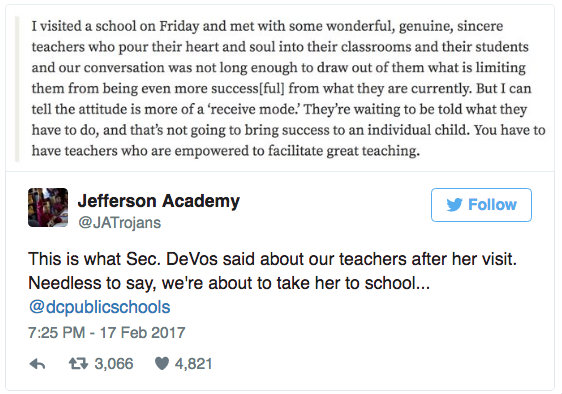Calling All Teachers: Let’s Collaborate, Not Compete
A MiddleWeb Blog
 It’s a tough time to be a teacher.
It’s a tough time to be a teacher.
Yes, teachers as a group have always been seen as an underclass of professionals, but in recent years the teacher bashing rhetoric is downright vitriolic.
If you believe what you hear in the media, teachers are lazy, money grubbing, undereducated, ineffective whiners.
Teachers as scapegoats
Reporters and public figures state it as common knowledge and factual that America’s public schools are failing, unions have made teachers indolent, tenure means that bad teachers can never be fired, young recruits from Ivy League schools will save us all, and the list goes on.
The problem with this is that teachers have been the scapegoats for the perceived failure of the schools when the reality is much more complex.
A February Tweet from DC’s Jefferson Academy in response to Education Secretary Betsy DeVos’s comments after visiting their public school. See Emma Brown’s related Washington Post story here.
In addition to the constant daily barrage of demoralizing contempt (or blatant patronizing) they receive, teachers are also being asked to do more now than they ever have. The demands placed on them by reformers outside of the field of education are unrealistic at best.
All with a smile and a song
There is the myth of the teacher who should be willing to work for lower pay than those with commensurate degrees and experience, spend ten hours a day at work plus take home even more, take on numerous extracurricular duties to help the school, spend their own money to further their education and pay for credentialing exams, pay for basic supplies to stock their classrooms, and entertain students better than a video game – all with a smile on their face and a song in their hearts.
There is a prevailing notion that somehow teachers should be more altruistic than people in other professions and willing to work under these conditions for “the good of the children.” Fortunately for society, teachers are generally idealistic and they do just that.
Internalizing denigration
But there have been unfortunate side effects of the constant bashing of teachers and putting their performance under a microscope: teachers are so beaten down that they are giving up instead of fighting back.
What’s more, not only do teachers as a whole find it difficult to counteract all of this negative public opinion (sometimes among our own friends and families), but they have even begun fighting amongst themselves.
In much of the reporting done about education, there is an artificial dichotomy put forward pitting the “old, tired teacher” against the “young, fresh teacher.” The prevailing wisdom is that the issues in schools could be solved and kids could start achieving at higher rates if only all of those ancient, lazy teachers (who are higher on the pay scale, too) would retire and make room for new blood and better ideas.
Stereotyping vets and rookies

The result of this perceived competition is that, in general, neither group has been able to learn from and work with the other to advance the profession as much as they could.
While educators may not be able to reverse a few decades of misinformation about their profession overnight, one thing they can do to improve their own morale and school climate is collaborate with colleagues across all the career stages, bringing an open mind and a common goal: to appreciate the unique gifts each group brings to the table.
Reaching beyond stereotyping to collaboration
We all got into the profession for the same reason, and I suspect we will find that we are more alike than we realize. Both veteran teachers – those in the profession for five to 10 years and more – and newer teachers – those with five or fewer years of experience – have valuable, unique skills and perspectives and could learn from one another. In the end, we all want to do what is right for our students.
• What experienced teachers can offer
Veteran teachers can offer valuable resources from their personal treasure troves. They have already developed curricular materials for their subject area and should be willing to share these with teachers entering the profession. The first couple years of teaching are tough enough without having to reinvent the wheel. In addition, purchasing ready-made materials is expensive, often of poor quality, and may not fit with a school’s curriculum, so it is a waste of the limited funds newer teachers often receive.

I understand that sharing your work with others is a risk because it involves the potential for criticism, but if experienced teachers are willing to declare a timeout from compeition, forgo our egos, and share freely with our less experienced colleagues, the act of reflecting and collaborating on our work will only make it stronger.
Those who have been in the classroom for a long time also have the wisdom afforded by extensive contact with our other constituents – the parents. For newer teachers, this can be one of the most difficult parts of the job. Veterans can help a less-seasoned colleague with ways to smooth over the rough edges of a potentially difficult conversation.
In addition to having helpful advice about working with parents, they have also navigated the school district’s politics and can be a valuable resource in how to get things done, where to go for different types of support, and where to find the coffee pot (something I have always found a necessity).
Another area of great stress for all teachers, but particularly those new to the profession, is classroom management. This is definitely something that takes time to develop. After a decade teaching, most teachers have witnessed the gamut of behavior one is likely to encounter for the age group and can provide valuable insight into tried-and-true techniques for modification.
When experienced colleagues reach out and share their expertise, rookie colleagues appreciate the kindness and it goes a long way in building a strong foundation.
• What new teachers can contribute
In addition to all that veteran teachers can offer their newer colleagues, the opportunity for reverse mentoring also exists.
Freshly-minted teachers offer enthusiasm, energy, and the most recent best practices being taught in universities. Because they have recently been in school, they tend to be informed about the most current professional development texts, updated brain research, and the latest education technology.
They are closer in age to the students they teach, so they can relate to them on a different level. They have also been in a classroom themselves recently and know what kind of teaching has been ineffective for them. Perhaps best of all, they offer their idealism, which often stands to remind long-time teachers why they got into this in the first place.
Working together for the profession and the students
One of the biggest obstacles preventing collegial working relationships among the various generations of teachers is our own failure to resist the stereotypes.
If you are a newer teacher and believe all veteran teachers to be old, technophobic, and out of touch with kids today, you are missing the chance to have a true apprentice relationship where you can be taken under someone’s wing who will teach you to fly.
If you are an experienced teacher and believe all newer teachers are going to come in and usurp your place in the department or become the darlings of parents and students because they are so “cool,” you could pass up the chance to make the profession stronger by mentoring the next generation of teachers to carry the torch forward AND learning something new about engaging the kids of today.
The stereotypes of the grizzled veteran and bright-eyed newbie represent but a fraction of each of these groups. Many veteran teachers I know (including myself) are well-versed in technology, but want to make sure that there is sound pedagogy behind the bells and whistles before going all-in. Many newer teachers have strong classroom control and can design motivating, challenging learning opportunities for their students.
Regardless, the option to learn from one another rather than feel threatened is the goal. We will be stronger teachers for it, and our students will reap the rewards. Inviting any and all of our colleagues into our classrooms is a great way to begin.
Taking the message beyond the classroom
One of the best ways to counter the negative images of teachers is to get out there beyond our classroom walls and share the wonderful things happening in our schools. Pulling back the curtain and talking about what our professional collaboration is accomplishing shows the public the strength in a cohesive, congenial faculty.
There is strength in forming a united front and really making the teaching profession work for all involved. There’s some truth in the trite expression that a rising tide lifts all boats – but we need to add agency. WE are the tide that can end the ridiculous, unnecessary competition between veterans and rookies and insure success for all of us and all of our students.
Feature image source: Skyline College
































Spot on, Cheryl! This is such a relevant and important topic! There are great teachers of all ages and experience levels, and we need to put out heads together to figure out what works best for current students.
I am an older international teacher who has 42 years experience in classrooms in a variety of countries. I am always prepared to discuss education and willing to adapt the practices in the classroom.
I do not consider myself a dinosaur!